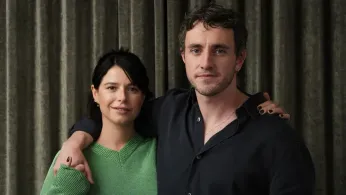
5 hours ago
How Jessie Buckley and Paul Mescal Found the Emotional Power of 'Hamnet'
Jake Coyle READ TIME: 6 MIN.
During the emotionally wrecking final scene of “Hamnet,” Jessie Buckley and Paul Mescal had an issue.
“There were moments where the camera was obstructing us,” Buckley recalls. “We were like: ‘No, we have to see each other.’”
“And then the minute we did see each other, it was like ‘Oh, no,’” Mescal says, laughing. “What a glorious thing.”
In “Hamnet,” Chloé Zhao’s adaptation of Maggie O’Farrell’s prizewinning 2020 novel, Mescal plays William Shakespeare and Buckley his wife, Agnes. It’s a fictional, speculative drama with basis in historical fact. One of the couple’s three children, Hamnet, died in 1596 at the age of 11. Within a handful of years, “Hamlet” would premiere at the Globe Theatre. The names, scholars have noted, were essentially interchangeable in 16th-century England.
Zhao’s film, which opens Wednesday in theaters, imagines the possible connection between the death of the Shakespeares’ son and the birth of the playwright’s greatest work. It’s a portrait of a marriage, in grief and literary greatness. In many ways, it’s also a movie about seeing and being seen. Both William and Agnes are drawn together as misunderstood near-outcasts. William is dismissed as “a pasty-faced scholar.” Agnes is branded a “forest witch.” Gaps of misperception and solitude are bridged by love in the film’s first half, and art in its overwhelming final act.
In both cases, Buckley’s and Mescal’s eyes tell much of the story. Their performances — raw, earthy, soulful — have been hailed as among the best of the year. Both are widely expected to land Oscar nominations. Though they acted in separate timelines in Maggie Gyllenhaal’s “The Lost Daughter” (2021), “Hamnet” is the first time on screen together for the two young, acclaimed Irish stars.
“We entered the film at the perfect juncture. I had huge respect for Jessie and loved spending time with her,” Mescal says. “But we were also at the point where we didn’t know each other all that well. So there was a kind of mystery.”
Before beginning production, Zhao staged a chemistry read for the two. It might go down as the most unnecessary chemistry read in Hollywood history. “We’d forget that we were saying lines,” says Mescal, sitting beside Buckley.
“There was such a kinetic energy already between us,” Buckley agrees. “It just felt so possible.”
Buckley and Mescal met this reporter earlier this fall just as “Hamnet” was making its prizewinning premiere at the Toronto International Film Festival. The film’s extreme emotionality was by then already earning an almost mythic reputation for turning moviegoers into puddles.
But Buckley, the 35-year-old star of “Wild Rose” and “Wicked Little Letters,” and the 29-year-old Mescal, who was soon to embark on playing Paul McCartney in Sam Mendes’ four-film series, entered jovial and wisecracking. Buckley, a new mother, made a remark about nursing before requesting it not be printed, and then reversing herself. “Ah, print it. What do I care!”
Once they settled in, though, both actors struggled to capture the enormity of their experience making “Hamnet.” If “Hamnet” has moved audiences, it has shaken its stars.
“We worked with Kim (Gillingham, a coach) for subconscious and dreams. She asks you these prompts as you start to work. One was: Why are you making it?” Mescal recalls, turning toward Buckley. “I don’t want to get into why I initially thought I was making it. But I remember sitting with you and looking up at the stars two weeks in. Something personal had been going on in my life before. I remember turning to you and going, ‘Oh, that thought was way too small.’”
Little is known about Shakespeare’s life and even less Agnes’. That meant the actors were using their own experiences as artists to try to better understand their characters. Each day of production, Zhao led the cast in a meditation of three deep breaths, a practice she’s continued at screenings.
“As actors, sometimes people just want you to wear a mask and put coats on, and I never find that satisfying,” Buckley says. “What Chloé wants you to do is move somewhere deeper within yourself to meet the person you’re going to come to understand. It’s not about masks. If anything, it’s about becoming more human and pulling off a layer of skin that you’ve maybe kept around yourself too tightly.”
Zhao, the Oscar-winning “Nomadland” director who last directed the Marvel movie “Eternals,” says she challenged Mescal and Buckley to play “extreme masculine and extreme feminine.” Since emerging with a pair of lyrical Lakota dramas, “Songs My Brothers Taught Me” and “The Rider,” Zhao has refined a rough-hewn naturalism that actors gravitate toward. To find a very different Shakespeare, she relied on those instincts.
“What we have to do as artists is try to find that commonality that transcends time and space and gender and religion,” says Zhao. “You say: What is the bone-deep humanity of that man that is also in Paul Mescal? That’s my job, to open that portal.”
“Hamnet” dares to suppose that all art, even something as epochal as “Hamlet,” comes from somewhere profoundly personal. Mescal’s Shakespeare, for instance, doesn’t go around eloquently spouting verses.
“How boring would that be!” says Mescal. “Anyone who writes like that isn’t walking around waxing lyrical. I think there’s a real engine underneath him. There’s someone who wanted to escape his life and love his life at the same time. He loved his life and loved his work. This constant conflict in him, charging around his life, restless-like.”
“That’s also you,” interjects Buckley.
“That was just the version of him that made the most sense to me,” Mescal responds. “I’m sure there will be someone at Oxford who’ll be like, ‘He would have spoken with a weird hybrid accent because of the time period.’ OK, whatever. I don’t care.”
“Hamnet” reaches a remarkable crescendo in a performance of “Hamlet” at the Globe that opens up deep wells of sorrow and oceans of empathy. It has already become one of the most talked-about finales of the year, and it’s when the movie’s belief in the transference of feeling becomes most palpable. Yet, cameras aside, it was a scene they struggled to find.
“To be completely honest, we had gone on this ginormous, epic journey of the heart. We got to the Globe. I had not a clue what to do. I was totally lost. I think Chloé was lost,” Buckley says. “The Globe flooded. There was a rainstorm for two days. You go on this huge journey and you’re like: Where does this end?”
But on the third day, something clicked for Buckley when composer Max Richter’s “On the Nature of Daylight” came on her playlist. She shared it with Zhao and something shifted.
“Sometimes as an actor, you feel like you have to do it yourself,” Buckley says. “She was like this lone wolf in the middle of this ocean of people. I realized on the third day how everyone around me was crucial. It became about surrendering to the community of feeling.”
Buckley and Mescal have already resolved to work together again.
“I feel like we’re going to meet each other at pinnacles of our lives and help each other unravel the next layer,” says Buckley.
“Hands down, it was one of the most important collaborations that I’ve ever had,” Mescal says. “It’d be insane for that to be the only time we did it.”
But it’s also possible that the final moments of “Hamnet” will forever stay with them. The scene’s power is owed, also, to the hundreds of extras who play a poignant role. Buckley's and Mescal’s eyes are locked on one another, but the play’s the thing — not just its transmutation of their private grief, but the play's resonance with all around them.
“Why we go to the cinema, why we go to the theater, why we tell stories is for these places to contain the parts of ourselves that are too hard to hold by ourselves,” says Buckley. “There’s this unspoken ocean between the person sitting next to you and the story, and the play is the vessel through which that transcends through.”
Buckley shakes her head. “It was incredible. Standing at the lip of the stage, I could just feel a tsunami of 300 people behind me opening up their hearts.”






